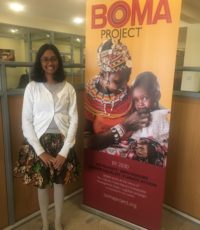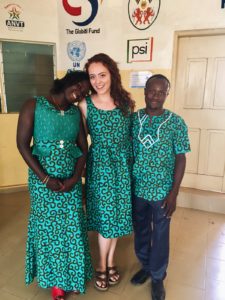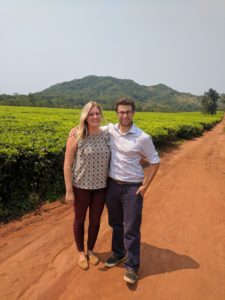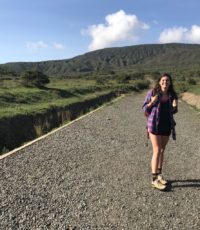January - February 2018
Happy Belated New Year! The Princeton in Africa office is bursting with excitement at the completion of interviews, where we had the opportunity to meet with nearly 200 inspiring applicants to learn about the skills that they could contribute to our 2018-19 fellowship class. We are now busy preparing for our Leadership Retreat, where all of our 2017-18 Fellows will reunite in Moshi, TZ to share best practices and lessons learned. I am also excited to introduce the newest member of our staff, Brianna Grausso, who interned for PiAf during the fall and has stayed on as the Development and Administrative Associate.
We hope 2018 treats you well and that you enjoy this month’s edition of the Fellows Flyer.
PiAf Connections
Please click below to check out pictures of our Fellows, Alums and other members of the PiAf family meeting up at home and around Africa.
Notes from the Field
By Neena Aggarwal, 2017-18 Fellow with The Boma Project in Kenya

Neena at the BOMA office.
As the Monitoring and Evaluation Fellow at the BOMA Project in Nanyuki, Kenya, I am grateful to be working my dream job of gaining M&E experience in a development organization and collaborating with locals in another country. Through data analysis and research, the M&E team measures BOMA’s impact, successes and shortcomings.
The basics of my daily routine are similar to what it would have been were I working in the U.S. – waking up a few minutes too late, scrambling to get ready for work, working in an office, running errands or volunteering, exercising, eating dinner, watching Netflix and sleeping. The details interspersed within this routine, though, are what put a smile on my face every day and make my life in Nanyuki professionally, personally and culturally enriching.
As I leave for work, I am greeted by the guard at my housing compound with enthusiasm and a big smile, warm sunshine and a grandiose view of snow-capped Mount Kenya. Every work day begins with greeting everyone and shaking their hand, which I feel strengthens our personal connections – a significant part of BOMA’s culture. When I first arrived in Kenya, the staff was so welcoming and friendly (a coworker gave me a hug on my second day even though I had forgotten her name), and now the office feels like a family away from home. At lunchtime, the whole office takes a break together for a chance to get to know each other better, recharge and indulge in delicious Kenyan food. My favorite place to spend evenings is at Simama, a home for street children, where we dance, talk and joke around. Thanks to the minimal light pollution, I love looking up at a sky full of stars at the end of the day. There are so many other gems of Nanyuki I could write about, such as the small town feel, how strangers have gone out of their way to help me navigate a new place, the vibrant fabrics and beads or how people are always willing to spend time with you, even if you just met.
From these daily experiences I have learned:
– The value of having enough time for everyone, whether it be taking time to greet people in the morning, putting laptops down and eating lunch together or making time to get to know a new friend.
– There is no limitation to who a friend can be. In the U.S., all of my friends are 20-23 years old and have attended a four-year college. In Kenya, my friends are from an array of socioeconomic statuses, have grown up with diverse cultural backgrounds, range from ages 6 to 55 and have educational levels varying from not having attended beyond primary school to having a PhD.
– Taking a lunch break is a worthwhile use of my time and makes the rest of the day more productive.
– Focusing on life’s little pleasures makes every day a little more exciting.
Notes from the Field
By Amanada Fenwick-Smith

Amanda with her office-mates, Agnes, Research Coordinator, and Kossi, IT Specialist, in their matching holiday outfits.
A little more than a month after graduating from Georgetown, I sat on a 7-hour bus ride from Lomé to Kara, where I’d be living for the next year working as a Monitoring and Evaluation Fellow for Hope Through Health. I sat immobile the whole bus ride, afraid to budge the passenger next to me. Six months later, back on that bus, I shared fried plantains and talked for hours with the woman crammed into the seat next to me. After 6 months of challenges and victories, the good and the bad of daily life had become easy to take in turn. I don’t think twice anymore about things that made me nervous when I first got to Togo.
Togo is known as a “hardship” country for Peace Corps and State Department placements, but this country cannot be boiled down to a word like that. I think living and working here can be summarized to a phrase that greets any hardship I’ve experienced here: “du courage.” Literally translated to “be brave,” it encompasses so much more than that. It’s the “you’ve got this,” the “stay strong,” the “don’t forget to smile” that make my victories here mean so much more than the challenges.
I work with the clinical staff that care more about the survival and joy of their patients than their midday repos. With every challenging moment, every moment where I question what I’ve gotten myself into, every moment that I consider what a placement somewhere easier would be like, something happens that makes me smile, and makes me so happy to be in Kara. I’m inspired daily by the people I work with, and by the incredible programmatic successes and developments I’ve gotten to be a part of. The people I work with make me laugh every day, and inspire me to keep pursuing the career in public health I’ve always dreamed of.
I broke my foot within a month of being here, something I don’t wish upon any other person, but it was an incredible opening line for conversations with zedmen (motorcycle taxi drivers), shop owners and people at work, and garnered me quite the reputation. The first thing every single person said to me? Du courage. I suppose I became a pretty recognizable figure around town: tall, incredibly pale with red hair, and a massive boot, riding around on a motorcycle without a care in the world. Even five months after I stopped walking with a boot on, both acquaintances and total strangers would stop me in the street to check and ask how my foot was doing.
So yes, I’m still challenged by life in Kara – my water and electricity have been going out pretty regularly these days and everything I own (myself included) is nonstop coated in a layer of dust from harmattan, but du courage.
Notes from the Field
By Jeff Levine

Jeff out in the tea fields with former fellow, and current Imani employee, Laura.
On Sunday I sit on the porch, and read.
This in itself isn’t remarkable, it seems wholly ordinary. Ignore the view, arcing over a valley, sometimes dusky brown, sometimes flashing green with the rains, houses crammed together, and Mount Michiru in the foreground. Ignore the puppies ––nothing is more Malawi than not realizing one of your dogs is pregnant until the moment she actually gives birth. Ignore the cup of Satemwa tea, and ignore the wifi (or lack thereof).
And just, sit. Of the many generalizations made about Millennials, I will grant one truth: we are very good at keeping busy. There is something terrifying in the idea of doing nothing, and a need to define the value of something by the productivity it entails.
This is an attitude that is optimized for the workplace, but not so much for the quiet spaces in between. And so, we make do. When the power goes out, I sit on the porch with my roommates, and we talk, play board games or read. You learn to treasure the quiet spaces, to see that they were what you were looking for the whole time, and you wish the power could be off more often.
—————————–
I was taking a hike this past Saturday, and as we walked up the mountain, we encountered 5-10 mini-church congregations. They were 7th Day Adventists (thus, the Saturday service), holding court and singing, each in their own pocket. There were no ministers, no prayer-books, no building, but it only took the feeling in the air to know that Nyambadwe Hill on a Saturday was a quiet space as well.
—————————–
Two questions about this moment:
- How do we appreciate a moment like this in a way that isn’t recursive, reductive, or appropriative?
I don’t know. The “slow down” narrative has been told time and time again, and the connotations that go along with it are ones of backwardness, tribalism, and a misplaced longing for pastoralism. I suppose, like most things, the best way to go about it is to talk, but mostly listen, to as many people as you can. To join in on the service once and awhile.
- How does one reconcile a moment like this with the moments of sadness, hypocrisy, and inequality that we see as Fellows?
Take them as part of a whole. Part of slowing down means catching things you might have missed before. It means listening (again), when we might not have before. It means laughing at the ridiculous fact that a plot of maize is being grown at the top of the mountain, and acknowledging that it is there because there is nowhere else left to grow it.
Notes from the Field
By Mallary Taylor

Mallary hiking Mount Longonot, a stratovolcano in the Great Rift Valley in Kenya.
In early January, members of the Somalia Cash Working Group gathered in a tightly-packed conference room in Nairobi’s Gigiri neighborhood, facing a screen broadcasting a video conference from Mogadishu. During this first monthly meeting of 2018, members grappled with the most effective way to implement emergency cash assistance in an environment of reduced international funding, how much cash to transfer per household, and how to translate ongoing cash-based assistance into a sustainable safety net that will help Somalis withstand future shocks due to drought and conflict.
Sitting among participants from international and national NGOs, donors, and UN agencies, I thought back to my first meeting with the CWG in September. I had entered this same room feeling intimidated and unprepared to represent the International Rescue Committee, keenly aware of my ignorance when it came to cash programming.
Cash transfer programming (CTP) has been a huge—and increasingly important—component of the famine prevention strategy in Somalia, especially during the drought response in 2017. CTP refers to the provision of cash instead of, or to complement, the delivery of in-kind assistance like food, blankets, and other goods. Evidence suggests that cash-based programming is effective across a number of wellbeing indicators, including improvements in food security, health, nutrition, and educational outcomes, as a way to empower women and girls, and as a link between disaster risk management and social protection systems. Cash-based programming allows communities to strengthen their local economies through spending, and can also be faster and more efficient than delivering in-kind goods and services, especially in hard-to-reach areas. Perhaps most importantly, cash gives people the power to make their own choices—autonomy that is desperately needed but often missing in humanitarian contexts. One of the most remarkable parts of this fellowship has been the duality of learning about evidence-based practices like CTP while simultaneously analyzing the minute details of how to implement and measure these programs on the ground in Somalia.
In the meeting, I was once again struck by the privilege of this fellowship and the fact that I have a seat at the table in these discussions. My experiences with the IRC’s cash programming have allowed me to participate in these macro-level policy discussions, and have also given me the opportunity to hear stories from families receiving cash assistance through our programs. Humanitarian assistance can be rife with moral and ethical dilemmas; that is a reality that I have contended—and continue to contend with— during my fellowship. My involvement in cash programming with the IRC has been a unique chance to grow professionally, and has served as a proxy for considering larger questions in this field—namely how I can leverage my own privilege to benefit others, and how the humanitarian and development sectors can consider and include our program participants at every level of policy and practice.
Notes from the Field
By Veda Sunassee

Veda Sunassee, Director of GSP 2012
Veda Sunassee joined African Leadership Academy (ALA) in 2010 as a Princeton in Africa Fellow. He majored with a degree in Political Science and Political Economy from Princeton University, though he spent his first two years of college studying Mechanical & Aerospace engineering. Veda also has a deep passion for entrepreneurship, a field that he explored during a sabbatical from Princeton following his sophomore year when he journeyed back to his village, St. Julien D’Hotman, on the tiny Indian Ocean island of Mauritius.
There, he was inspired to form the Young Volunteers Association (YVA) in an effort to promote civic engagement. Veda also spent a summer at Ashoka (one of the world’s leading social entrepreneur organization)’s global office in Washington D.C., where he helped supervise a Baltimore-based project that converted some of the city’s most troubled alleys from crime scenes into green community spaces. At Princeton, Veda co-founded the Princeton Social Entrepreneurship Initiative (SEI), which seeks to create an environment where every student can become a catalyst for social change by weaving leadership, entrepreneurship, design, and transformative thinking into the fabric of the Princeton experience. Through SEI, Veda created the first ever social entrepreneurship track for TigerLaunch, an annual business plan competition organized by the student-run Princeton Entrepreneurship Club. Veda also co-founded the I3 Award that recognizes inspirational, innovative, and impactful entrepreneurs.
At ALA, Veda is a faculty member of the Entrepreneurial Leadership department. He considers it a real privilege and treat to coach some of the most brilliant minds from all across Africa.
Quote from Veda: “I do not teach, I only facilitate my students’ learning.”



